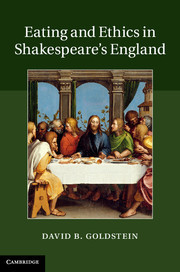Description
Eating and Ethics in Shakespeare's England
Author: Goldstein David B.
Goldstein presents a lively analysis of Shakespeare, Milton, religious writers and recipe book authors from the perspective of communal eating.
Language: English
Eating and Ethics in Shakespeare's England
Publication date: 11-2013
290 p. · 16x23.5 cm · Hardback
Publication date: 11-2013
290 p. · 16x23.5 cm · Hardback
Eating and Ethics in Shakespeare's England
Publication date: 10-2017
Support: Print on demand
Publication date: 10-2017
Support: Print on demand
Description
/li>Contents
/li>Biography
/li>
David B. Goldstein argues for a new understanding of Renaissance England from the perspective of communal eating. Rather than focus on traditional models of interiority, choice and consumption, Goldstein demonstrates that eating offered a central paradigm for the ethics of community formation. The book examines how sharing food helps build, demarcate and destroy relationships ? between eater and eaten, between self and other, and among different groups. Tracing these eating relations from 1547 to 1680 - through Shakespeare, Milton, religious writers and recipe book authors - Goldstein shows that to think about eating was to engage in complex reflections about the body's role in society. In the process, he radically rethinks the communal importance of the Protestant Eucharist. Combining historicist literary analysis with insights from social science and philosophy, the book's arguments reverberate well beyond the Renaissance. Ultimately, Eating and Ethics in Shakespeare's England forces us to rethink our own relationship to food.
Introduction: eating relations; Part I. Cannibal Ethics: Excursus: The Body Edible: 1. The cook and the cannibal: Titus Andronicus and New World eating; 2. I will not eat with you: failures of commensality in The Merchant of Venice; Part II. Communion and Community: 3. Anne Askew, John Bale, and the stakes of eating; Excursus: Receiving the Recipe: 4. How to eat a book: Ann Fanshawe and manuscript recipe culture; 5. Eaters of Eden: Milton and the invention of hospitality; Conclusion: toward a relational ethics of eating; Bibliography.
David B. Goldstein is Associate Professor of English at York University, Toronto. He writes on issues related to Shakespeare, early modern and Renaissance literature, food studies and contemporary poetry. He has received numerous grants and awards, including fellowships at the Huntington Library, the Lilly Library and the University of Wisconsin, Madison. A former food magazine editor and restaurant critic, he is also a widely published poet.
© 2024 LAVOISIER S.A.S.




